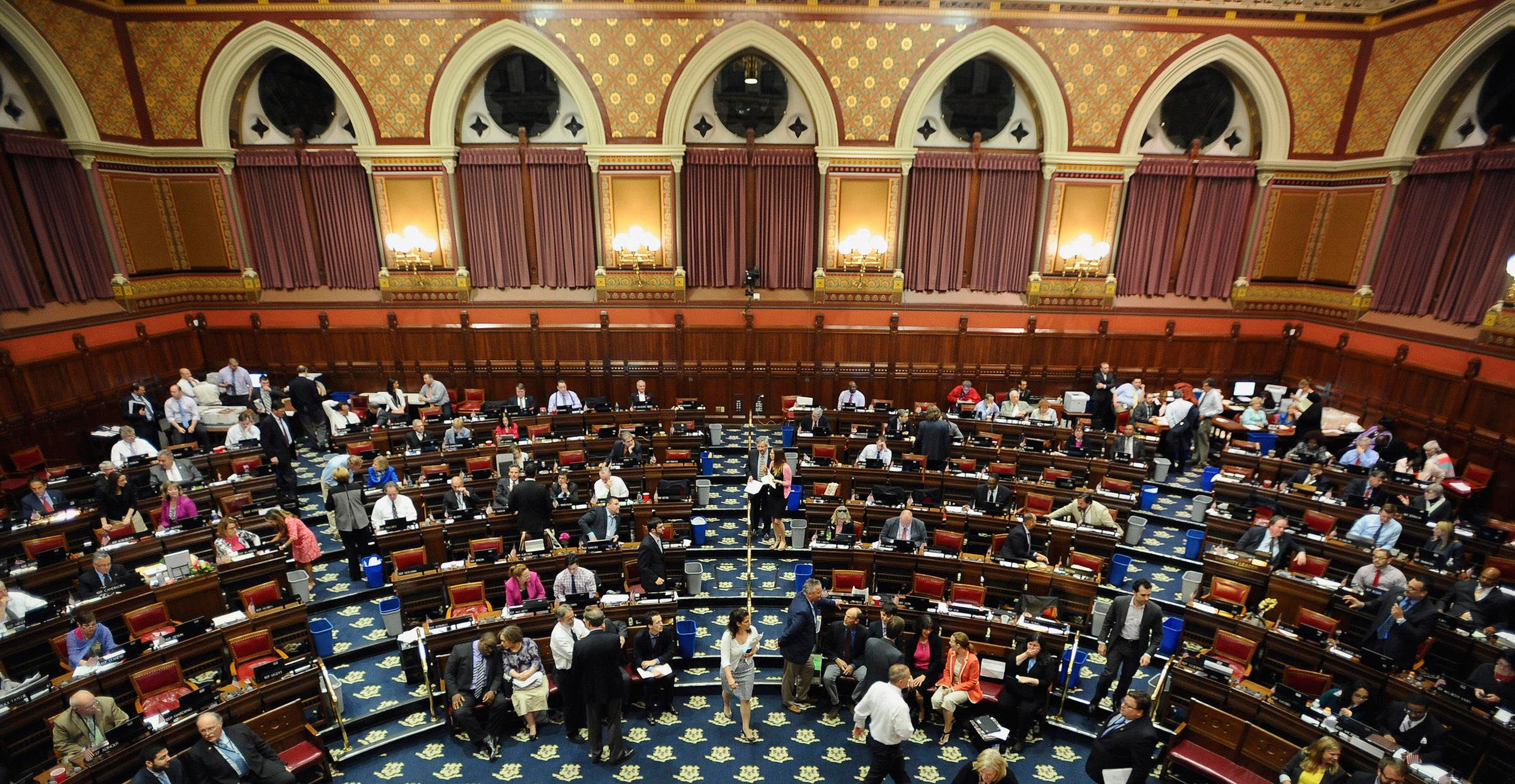
6 minute read
No New Mandates
Relief from existing mandates is only part of the battle. As mentioned, each year, a greater amount of new mandates are proposed on towns and cities. Below you will see a list of unfunded mandates that have been proposed in previous legislative sessions. They are likely to be seen again in the 2021 legislative session. If adopted and passed into law they would further handicap already struggling towns and cities.
Environment Issues
Every year the legislature proposes numerous unfunded mandates pertaining to the environment. The negative fiscal impact of these proposals varies. However, while some may carry smaller fiscal notes, their collective impact will further constrain local budgets and force Connecticut residents to shoulder an unnecessary fiscal burden.
Such proposals include:
Extension of the pesticide ban:
Existing law prohibits the use of lawn care pesticide on the grounds of preschools and schools with students in grade eight or lower, except in instances where a human health emergency is present.
In previous years, the Legislature has considered proposals to extend the current pesticide ban to high school playing fields and municipal greens. Such proposals would expand a costly unfunded mandate on towns and cities already faced with rapidly deteriorating fields and large expenses in attempts to rehabilitate them. Towns and cities continue to struggle to maintain safe playing fields for our children at the K-8 level. These proposals would simply extend those same problems and costs to high school fields and municipal grounds.
Municipal officials are second-to-none in ensuring the safety and health of children. Not only are municipal officials parents, but they have a fiduciary duty to protect and defend the public’s interest.
CCM supports the creation of a balanced Advisory Council within DEEP to thoroughly examine and vet the facts surrounding field management and provide recommendations as to how specific synthetic and organic pesticides are reviewed and approved for use.
Furthermore, the Legislature can take proactive measures to help municipalities reduce the impact of unfunded and underfunded environmental mandates by enacting legislation that will allow municipalities to create Stormwater Management Authorities to help offset the significant costs of meeting the requirements of the General Permit for Municipal Separate Storm Sewer Systems (MS4).
By amending CGS 22a-498, which was adopted in 2007 and created a Pilot program for four municipalities allowing them to create such authorities with approval of DEEP it would authorize any municipality to create such an authority. These authorities could among other things, levy an assessment on real property based upon the amount of impervious surface contained on the property. These fees may be waived if the property meets low impact development regulations and/or stormwater retention standards as identified within the current MS4 Permit. Fees collected based by a Stormwater Authority would be used by the municipality to offset the cost of stormwater mitigation efforts as outlined within the proposed language.
For example, a Stormwater Authority created with the passage of this bill could assess a stormwater maintenance fee based on the following principal:
• Rate x Property’s Impervious Area = $ Fee
• The fees and rates for each municipality are set so that there are sufficient funds to properly manage their respective stormwater programs and to meet federal and state regulatory requirements and unfunded mandates.
• The amount this will generate for each municipality will vary by town based on the percentage of impervious surfaces in the municipality as well as the cost of administering the stormwater program.
Mandating Recycling:
Municipalities are mandated by regulations established under CGS Section 22a-241b (R.C.S.A. §§ 22a-241b-1— 22a-241b-4) to recycle designated recyclable items, as defined by the section. In 2017, the Chinese Government announced The National Sword, a policy that limits the kind of recyclables the country accepts. No longer will China take on what it terms “foreign garbage,” limiting the amount of impurities in recyclables in order to protect its own environment, which is the world’s most polluted (rated by CO2 emissions, America is number two). As a result of China’s new policy, certain recyclables like mixed papers and plastics are now considered contaminated, and are required to be sorted out. This not only increases facilities costs in sorting the products, but the ability of those facilities to sell the products. Those factors are among the many placing local governments in the state on the hook for the expanding costs of managing packaging materials, especially plastics. The current slump in recycling markets has helped draw attention to the fact that taxpayers and ratepayers bear the primary risk of any downturn in the value of collected material. When recycled commodities markets slide, additional taxpayer or ratepayer subsidization of community recycling programs is required. In the era of ongoing budget crises, the value of recycling has been increasingly called into question, and some communities are now being forced to pay for rather than be paid for these materials. The price tag and logistical challenges of dealing with packaging materials – through collection, recycling, disposal, waterway and beach cleanup, street sweeping, storm water capture, and outreach and education – are spiraling upward.

Just Cause for Dismissal for Certain Municipal Officials
In previous legislative sessions, various proposals have been considered that would have mandated special protection for fire chiefs under a “just cause” provision. In recent years, other municipal department heads have attempted to mandate “just cause” employment provisions. This provision would make it very difficult and costly to remove local officials from their position.
Currently, police chiefs have this special “just cause” provision. CCM can understand the rationale for these individuals to have this provision as they may need the flexibility to investigate certain matters without fear of political retribution. No other municipal official would be in that particular situation.
If such a mandate were to pass into law for another class of employees, it is highly likely to be expanded to other municipal employee groups.
Current statute already includes special provisions regarding the dismissal of certain employees, such as a fire chief. This includes proper notification of pending termination, process for a hearing and appeal of any decision. Similar provisions apply to other municipal department heads, including building officials and fire marshals.
Municipal CEOs are accountable to the residents of their community. Such proposals would eliminate municipal CEOs’ discretion and flexibility to execute critical decisions regarding personnel.
Delinquent Property Taxes
In previous legislative sessions, various committees have considered legislation to reduce the interest rate a municipality may charge on delinquent property taxes. Municipal officials understand the desire to provide property tax relief during these challenging fiscal times, and CCM is a leading advocate for meaningful property-tax relief in Connecticut. However, these proposals could result in significant municipal revenue losses, especially when our distressed municipalities are struggling to provide core services to residents.
Such proposals would further negatively impact municipalities by requiring a town or city that lowered the interest rate on delinquent taxes, to reduce the interest rate charged on other delinquent property taxes as is required by law.
These mandatory reductions would include:
• Sewer system installation and collection assessments;
• Assessments imposed on blighted housing; and
• Fees and assessments charged to residents of certain districts within municipalities.
When you reduce incentives for persons to pay taxes on time, you impact taxpayers who pay their taxes on time – persons who are paying their fair share and supporting their municipality. Such taxpayers end up paying higher taxes to make up for those who are not paying at all.
Reducing property taxes would reduce the likelihood of taxpayer delinquency. However, this can only occur through meaningful property tax reform.
The 2021 General Assembly should properly intricately examine the impact new proposed mandates would have on local government, and if the State is unable to provide funding to implement, should reject these and other new proposed mandates.




